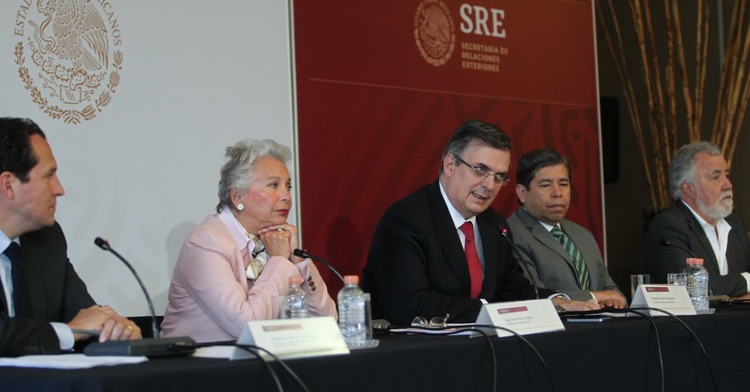Interior Secretary Olga Sánchez Cordero and Foreign Secretary Marcelo Ebrard discussed details of the immigration issue in Mexico at a joint press conference.
The Interior Secretary said the Mexican government's vision of migration has three essential areas of focus: protection of human rights, economic and social development in the Central American countries, and the orderly registration of migrants who enter Mexico as a precondition to allowing the government to protect their human rights.
The Interior Secretary reiterated that migration from Central America or other countries is not caused by Mexico, but the federal government is determined to address the issue. She said that, since last year, there has been unprecedented influx of Central American migrants, especially from Honduras and, to a lesser extent, from Guatemala and El Salvador.
There has also been an unprecedented increase in the number of women and children migrants, and an unusually high number of migrants from other nations have also entered Mexico. She said, "The federal government is doing everything it can to help these people and provide them with humanitarian assistance."
The only thing Mexico asks is that they help us by doing two basic things: First, respect Mexican laws and officials. And second, understand that registration is a precondition for deciding their immigration status in the country. "Keeping control of our southern border is not optional, it's an obligation of the Mexican government. This is what we are doing, in an orderly fashion and in compliance with the law," she said.
Foreign Secretary Marcelo Ebrard remarked that, for the first time, according to official figures, in January and February of this year Mexico was the top trading partner of the United States. Trade between the two countries amounted to USD 97.418 billion over the course of the two months. In addition, the Mexican government has already been notified of the first 500 million dollars of immediate investment resulting from the CEO Dialogue.
Accompanied by the Foreign Ministry's Deputy Legal Counsel, Alejandro Celorio Alcántara, the Foreign Secretary said that Mexico would continue to uphold the principles and decisions it has already taken regarding its immigration policy, with no changes.
He commented that he would be in Washington on May 7 for a conference organized by the Council of the Americas, saying that one of the main reasons for the visit would be to outline how to improve the relationship between Mexico and the United States, while understanding and accepting that we have different points of view on various subjects, one of which is migration.
National Migration Institute (INM) Commissioner Tonatiuh Guillén López said that there must be procedures that provide certainty and security and allow the government to know who is traveling through Mexico and how they are doing it. He said that the cards being given to immigrants are not transit visas.
Speaking to the press in the Foreign Ministry's José María Morelos y Pavón Auditorium, he explained that the INM is moving towards giving out the cards more selectively, but not stopping them, since they are important for humanitarian protection and inclusion in Mexico.
"It's a complex scenario. It's not that it has no solution, it's that we are working on the solution. Migrants receive all possible assistance at the immigration stations, but these centers are very pressed for space. We know that, but the situation is due in large part to the unusually high numbers of migrants. Many federal and state government institutions are making a huge effort to provide food, shelter and medical services," he added.
Regarding the incident in Pijijiapan, Chiapas, he said that immigration controls are carried out every day on both the northern and southern borders. These were people who did not want to register with the INM. They were aggressive towards the immigration agents when asked to register, so the Federal Police was asked to intervene.
The INM Commissioner said there were no injuries reported, and he regretted that a considerable number of children were involved. "One third of all migrants are now children, and that is worrisome," he said. "This composition has nothing to do with the Mexican government. The fact that children are coming from Honduras, El Salvador and Guatemala is a problem these countries must address."
The Undersecretary of Human Rights, Population and Migration, Alejandro Encinas Rodríguez, said forcefully that Mexico does not split up nuclear families. "That is a key principle of Mexico's immigration policy."
He argued that the federal government's actions regarding migrants have changed significantly, as can clearly be seen from the humanitarian assistance being provided that did not previously exist. Nor is there now a process in place for persecuting migrants.
